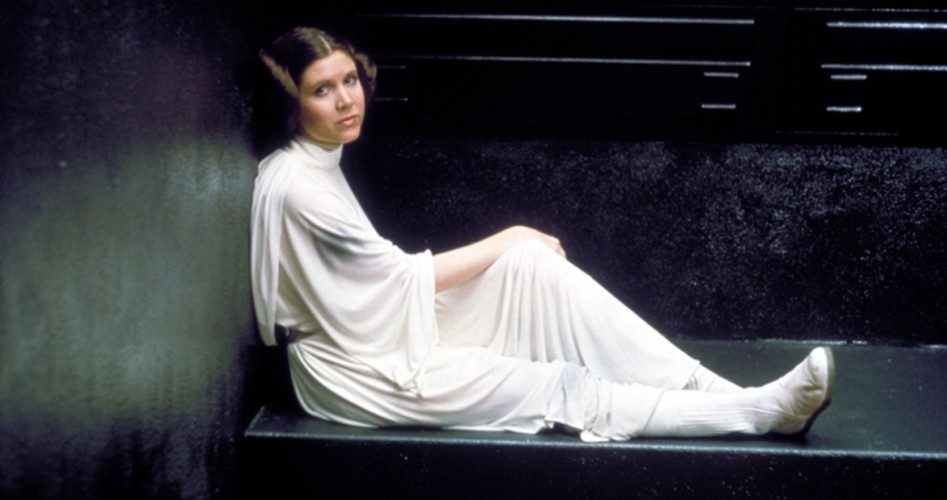
Most of us wouldn’t criticize a man mourning a friend, but most of us aren’t the politically correct thought police. Never shy about crashing a party — or a funeral — they reared their heads again when comedian Steve Martin paid tribute to his friend Carrie Fisher, who passed away Tuesday at the age of 60.
Martin’s trespass was to send a tweet stating, “When I was a young man, Carrie Fisher was the most beautiful creature I had ever seen. She turned out to be witty and bright as well.” The reaction was swift.
What sexism!
What misogyny!
What a pig!
What…what….
What nonsense, I say. The 71-year-old Martin quickly deleted his tweet, giving the thought police another victory. Perhaps he doesn’t know the difference between critics and box office, as most people simply aren’t offended by what Toronto Sun columnist Mark Bonokoski called “pointing out the obvious.”
“If Carrie Fisher had looked like Jabba the Hutt, she would never have been Princess Leia,” Bonokoski wrote, referring to the iconic character she famously played in the Star Wars series. And while critics have admonished Martin to be “better than Jabba the Hutt” — the Star Wars villain who once reduced Leia to scantily-clad sex-slave status — they perhaps should be better than Jabba’s obsequious, mind-numbed little court-jester-like sidekick and not kowtow to evil.
The Metro’s Mark Newbold touched on the truth when noting about Fisher, “To much of the planet, her looks appeared first.”
Actually, though, it’s generally the case that a person’s looks appear to us first; this is why, whether it’s Martin or someone else, looks are often what a person will mention first. For example, it’s not uncommon to hear, let’s say, when speaking of someone such as late wrestler Andre the Giant, “He was a huge, scary looking guy — but he was actually a smart, gentle fellow.” Or we might say about a little kid, “He’s a wee lad, but, boy, is he strong!” And what of saying of an elderly gentleman, “He’s 89 and looks every bit of it, but he’s as sharp as a whip”? Are we “objectifying” these people? Or just being normal?
In fact, just as a woman’s characteristic desire for security may cause her to note a prospective husband’s degree of success, a man will notice a woman’s appearance. This is wholly logical: Sexual attraction’s purpose is procreation. And beauty is a trait most associated with women in their child-bearing years (younger women). If men were attracted to octogenarians, the human race might disappear.
Bonokoski again noted the obvious in writing that it was Fisher’s “looks, in fact, that launched her career. This should be inarguable.” This gets at the hypocrisy. If the pc powers-that-be are so opposed to what they deem the “objectification” of women, they should stop relying on eye candy (and the male variety is used, too) to draw people to movies, sell products, and model clothes. Who stopped producers from having wizened grandmas play Princess Leia, Lara Croft: Tomb Raider, and Wonder Woman? It’s much as with guns: Hollywood hates them with a passion — but loves making money with them in its violent films.
Radio host Rush Limbaugh once made waves with the statement, “Feminism was established to allow unattractive women easier access to the mainstream.” If true, it clearly didn’t work. Fox News and other networks regularly roll out the comely female commentators, who dress most revealingly; in contrast, we don’t see their male colleagues dressing in sleeveless attire. The reason why reveals another truth:
While men may want to have their heads turned, most women want to turn them.
Thus it is, as a traditionalist mother once lamented to me, that it’s hard to find modest clothes for girls today. Male lust and female vanity are driving the market.
And that’s the point. A saner society wouldn’t indulge a politically correct Puritanism, which pours “righteous indignation into the wrong things,” as G.K. Chesterton observed about the original variety. It wouldn’t criticize a man for innocently noting a woman’s beauty while it imbibes entertainment that is lewd, crude, and infused with sex at every turn.
Photo of Carrie Fisher as Princess Leia in Star Wars Episode IV (1977): AP Images


